The Psychology of Sales: Uncover Buyer Behaviors to Win More Deals
Casey O'Connor
The psychology of sales is all about understanding the conscious and unconscious ways that buyers make decisions.
Most buyers like to believe that they make purchasing decisions based on logic, but the reality is that most humans rely a lot more on emotions in their thought processes than they realize.
When sales reps understand the psychology of sales, they can tap into buyers’ subconscious thoughts and emotions to create better relationships with buyers, improve their performance, and increase brand loyalty.
In this article, we’ll go over everything you need to know about sales psychology, including what exactly it is, why it’s so important to understand, and some principles and tactics to implement in future sales.
Here’s what we’ll cover:
- What Is Sales Psychology?
- Why Is It Beneficial to Use Psychology in Sales?
- The 6 Principles of Sales Psychology
- 10 Ways to Use Sales Psychology in Buyer Conversations
- Books on the Psychology of Sales
What Is Sales Psychology?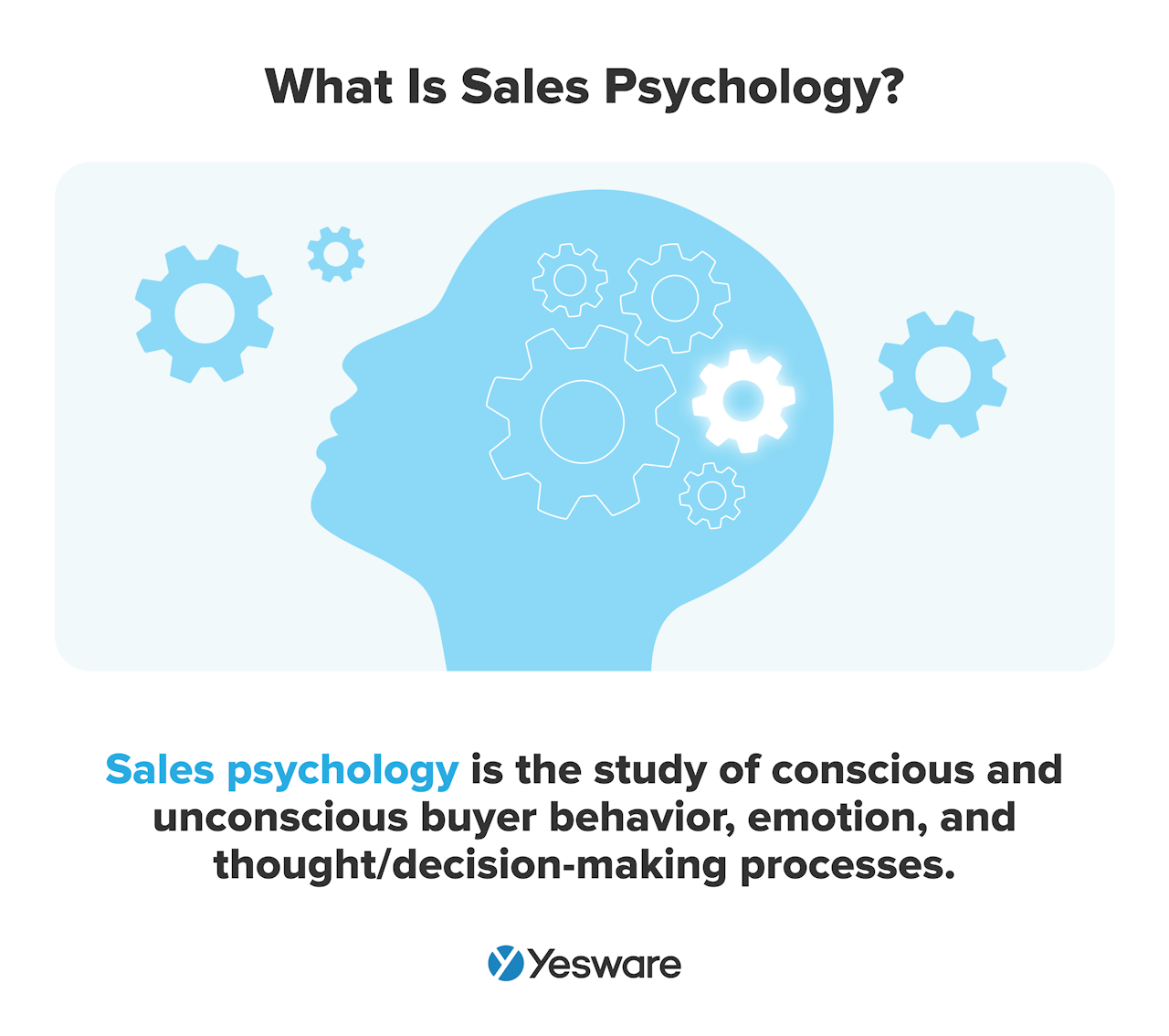
Sales psychology (also called buyer psychology or the psychology of selling) is the study of conscious and unconscious buyer behavior, emotion, and thought/decision-making processes.
When sales reps become well-versed in the psychology of sales, they can tailor their sales pitches to meet the unique and often unspoken needs of prospects.
Instead of creating a one-size-fits-all sales presentation, salespeople can use sales psychology principles to speak directly to the emotional needs of the prospect.
Sales psychology is all about understanding the details of your buyer’s psyche — what makes them tick? How and why do they make decisions? The better sellers understand how logic and emotion come together for each unique buyer, the more effectively they can sell to them.
All humans have an innate need to be understood by those around us; sales is no exception. When sales reps can use the psychology of selling to show prospects how well they understand them, it makes prospects more inclined to move through the buying process without friction.
Why Is It Beneficial to Use Psychology in Sales?
The relationship between buyer and seller in B2B sales is very important — much more so than in B2C sales. B2C buyers can more easily make decisions based on reason and logic, but B2B buyers rely heavily on their emotions — and therefore relationships — in purchasing decisions, even when they’re not aware of it.
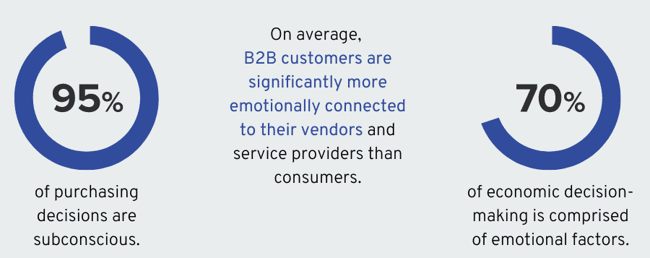
Sales psychology helps B2B sellers understand the unconscious factors that influence buyers’ decisions; this understanding creates deeper relationships, increases brand loyalty, improves overall sales performance, and helps sales reps advance in their careers.
Better Customer Relationships
Sales psychology helps sales reps connect with buyers on a deeper and more personal level. When reps practice the psychology of selling, they show empathy and demonstrate to the buyer that they are valued. This makes buyers more willing to follow through on a purchase.
Increased Brand Loyalty
Using psychology in sales helps prevent customer churn and retain more long-term customers. Sales psychology helps sales reps cross-sell and upsell more effectively and generate better referrals and online reviews.
Improved Sales Performance
When sales reps use sales psychology effectively, their entire sales process improves. Effective use of the psychology of sales has been shown to have positive impacts on marketing efforts, lead generation, sales presentations, revenue, profitability, and more.
Advances in Career
A good understanding of sales psychology can affect more than just a sales rep’s pipeline opportunities. Most sales psychology principles are also applicable to “real life” and don’t just work with prospects and customers.
A sales rep who’s good at sales psychology should be able to use what works for them in sales and apply it to their career ladder, as well. An understanding of sales psychology can help anyone succeed in a wide variety of roles and responsibilities.
The 6 Principles of Sales Psychology
In his book Influence: The Psychology of Persuasion, Robert B. Cialdini wrote about the six principles of persuasion. These principles, according to Cialdini, help explain why customers think, behave, and feel the way they do throughout the buying process.
Cialdini’s six principles of persuasion are: reciprocity, commitment & consistency, social proof, liking, authority, and scarcity.
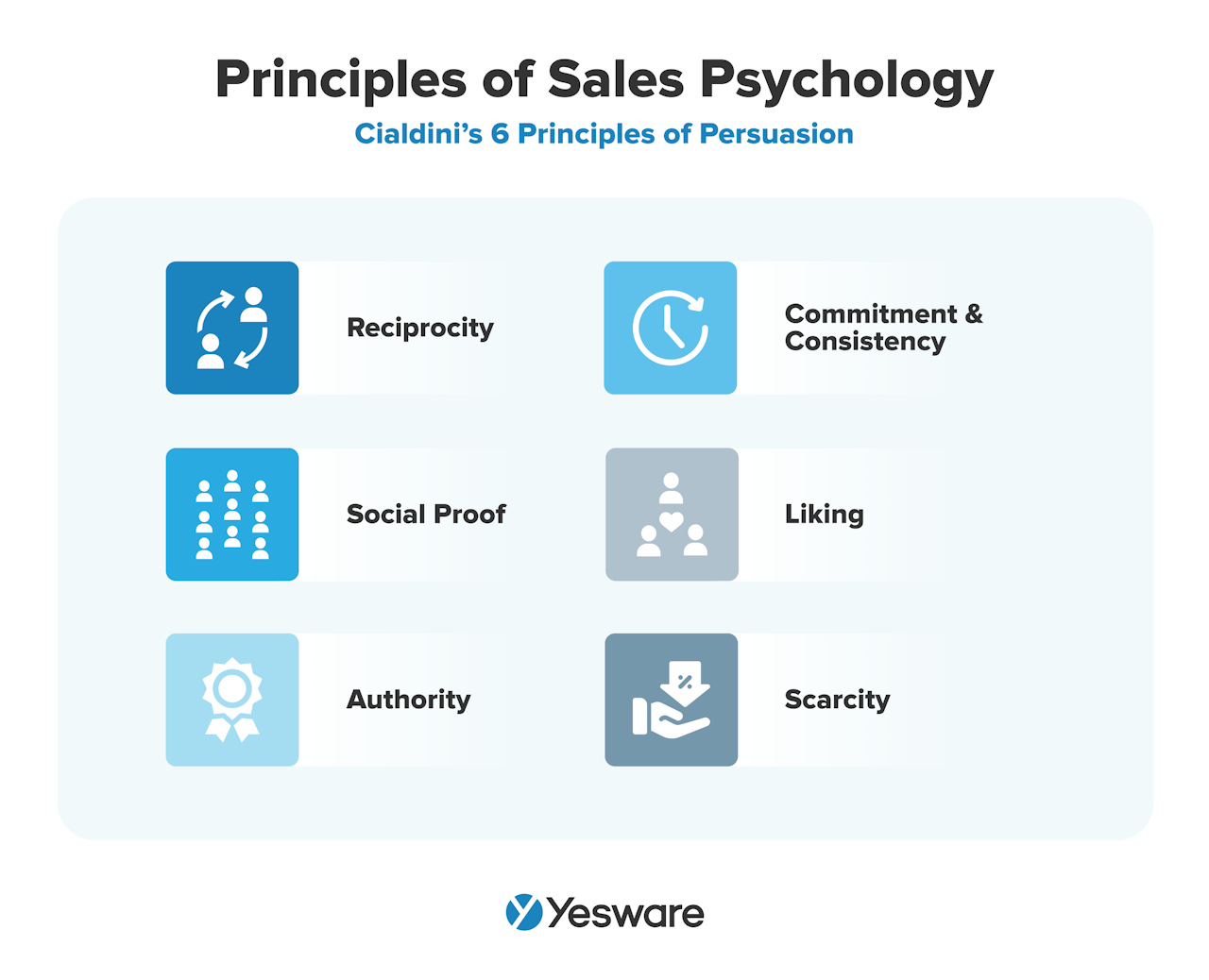
1. Reciprocity
When someone has a feeling of reciprocity, it means they feel naturally obligated to give something in return to someone who they perceive has given something of value to them.
For salespeople, “offering value” may mean acting as a consultant throughout the buying process by providing the prospect with education and insight at strategically-timed intervals.
It may also mean offering a free trial or other incentive that makes the prospect feel like they’re getting a good deal.
In doing so, you increase the likelihood that the prospect will be willing to give you something (a reply to your email, a scheduled meeting, their signature on the dotted line) in return.
2. Commitment & Consistency
People tend to stick with something to which they’ve already committed. This is one reason why free trials are so effective — it’s a lot easier for prospects to stay consistent with that decision and ultimately sign a contract than it is for them to reverse course and opt-out.
Asking leading questions can also be a great way to generate feelings of commitment and consistency. The more you can encourage prospects to agree or offer a “mini-yes” in regard to something minor, the more likely they are to continue that mindset when you ask them to commit to more significant terms.
3. Social Proof
Complex purchasing decisions can be challenging for the human brain, and we’re wired to look for shortcuts to ease the process.
One effective way to give the prospect the shortcut (and reassurance) they’re looking for is by offering social proof. 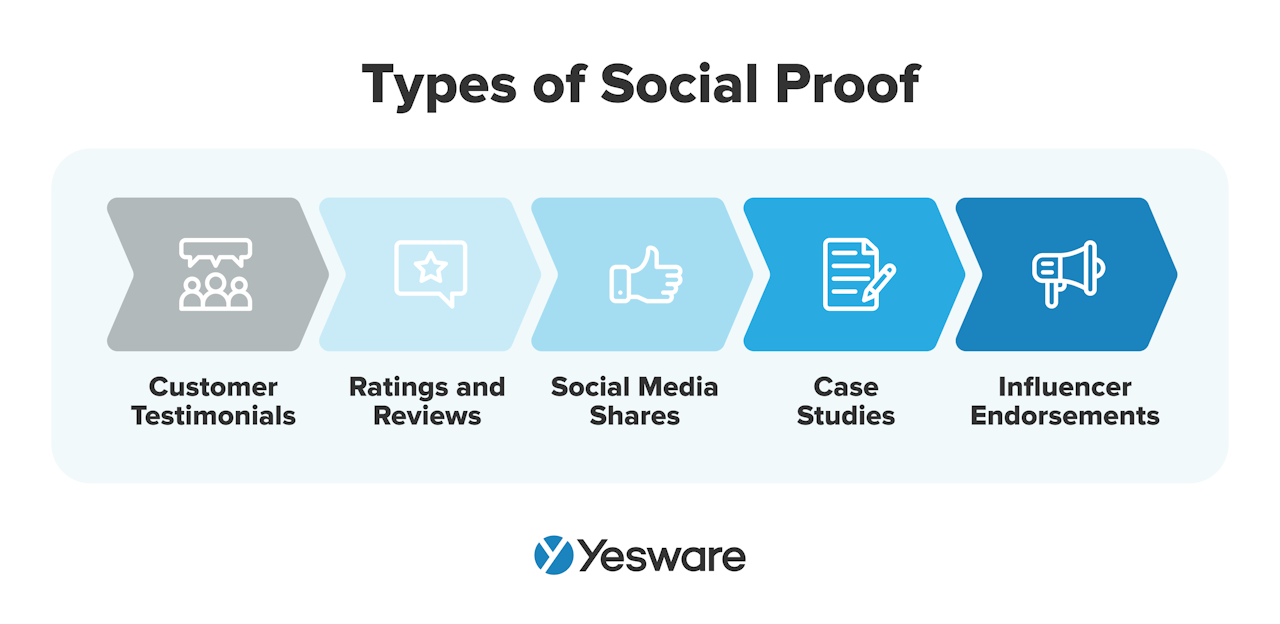 Case studies, online reviews, and testimonials are some of the most powerful and persuasive tools in a salesperson’s arsenal — 83% of buyers trust reviews over advertising.
Case studies, online reviews, and testimonials are some of the most powerful and persuasive tools in a salesperson’s arsenal — 83% of buyers trust reviews over advertising.
4. Liking
People need to feel like they actually like the person from whom they’re considering making a purchase.
Unfortunately, it’s not as straightforward as the “Just be yourself!” advice your mother likely gave you in middle school.
There are several scientifically-backed strategies that can help you efficiently earn your prospect’s trust and respect in the context of a sales conversation; try mirroring, compliments, and cooperation to fast-track your sense of camaraderie.
5. Authority
People who can demonstrate a sense of credibility and expertise are naturally more persuasive than those who appear less knowledgeable.
Confidence plays as big a part in this perception as actual knowledge, so don’t get hung up on whether you think you “know enough” to be considered an expert.
Personal referrals and positive reviews are also great sources of credibility. Just remember to stay humble — prospects will quickly pick up on the difference between a helpful expert and arrogant bragging.
6. Scarcity
Another way to influence prospects is by adding a sense of urgency to the process.
Be careful here, though — make sure any exclusivity or time-sensitiveness you advertise actually exists.
There are a variety of creative ways to achieve scarcity that are authentic and in line with your brand values; creating limited edition products, for example, is a natural way to increase the urgency to buy.
10 Ways to Use Sales Psychology in Buyer Conversations
There are many big-picture and tangible, strategic ways to use sales psychology in buyer conversations. Some are overarching principles to keep in mind throughout the conversation (like the fact that buyers like to feel in control). Others are actionable, specific tactics that sales reps can execute and measure results.
1. Be Quick to Respond
One way to increase your likeability, authority, and reciprocity is to be prompt in your replies to prospects. Anticipating their needs and questions and going out of your way to make sure they have what they need throughout the buying process goes a long way with buyers.
This is backed by research. Data shows that the sooner a sales rep responds to a lead, the more likely they will be to convert.
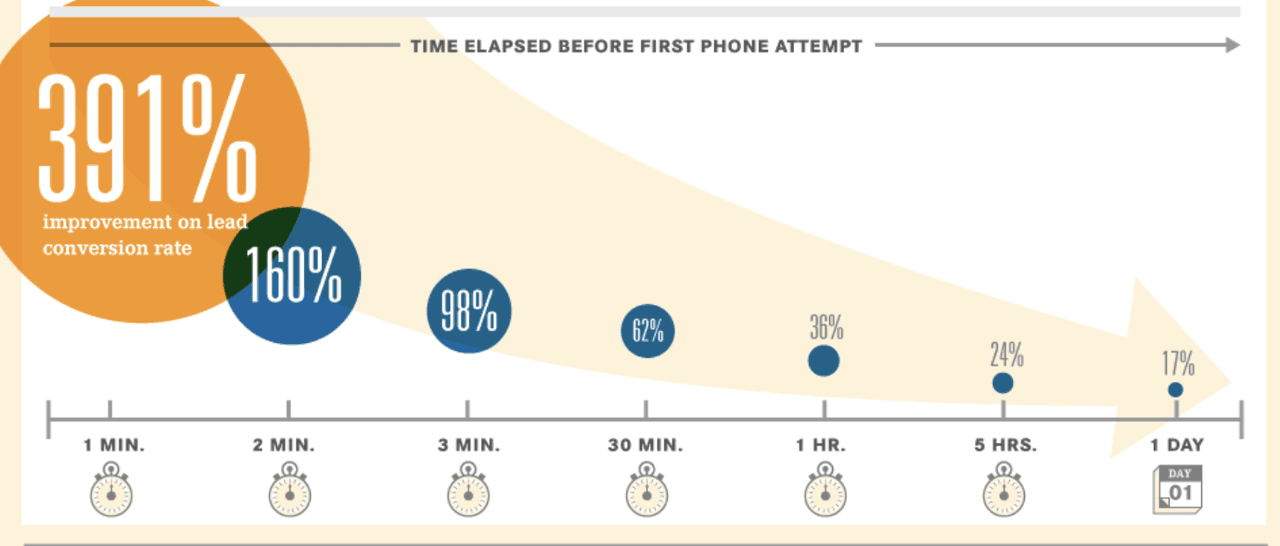
Note that the highest conversion rates come when sales reps respond within a matter of minutes, not hours or days. Promptness matters.
2. Learn the Best Times to Call
Yesware collected data from over 25,000 sales calls and found that the best time to call prospects for productive sales conversations are Tuesdays and Thursdays, 3:00pm – 5:00pm.
And, if you’re connecting via email, try sending your messages in the early afternoon, 1:00pm to be exact, for the best chance of getting a reply. 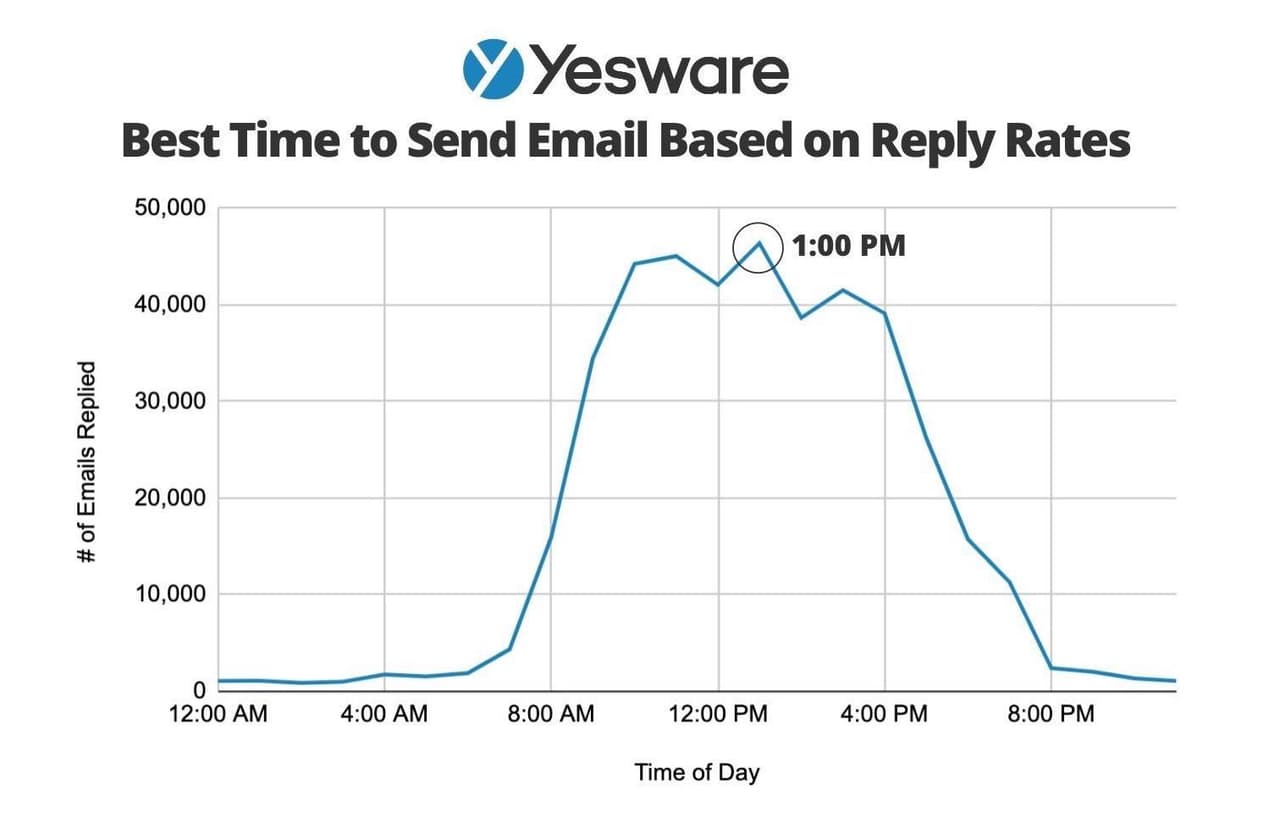 Some research even shows that up to half of all sales go to the first vendor to respond — sometimes, it really is as simple as being the first one to demonstrate willingness and ability to meet their needs.
Some research even shows that up to half of all sales go to the first vendor to respond — sometimes, it really is as simple as being the first one to demonstrate willingness and ability to meet their needs.
3. Stick With It
Did you know that 80% of sales require at least 4 follow-up emails, but less than 10% of sales reps go that far? 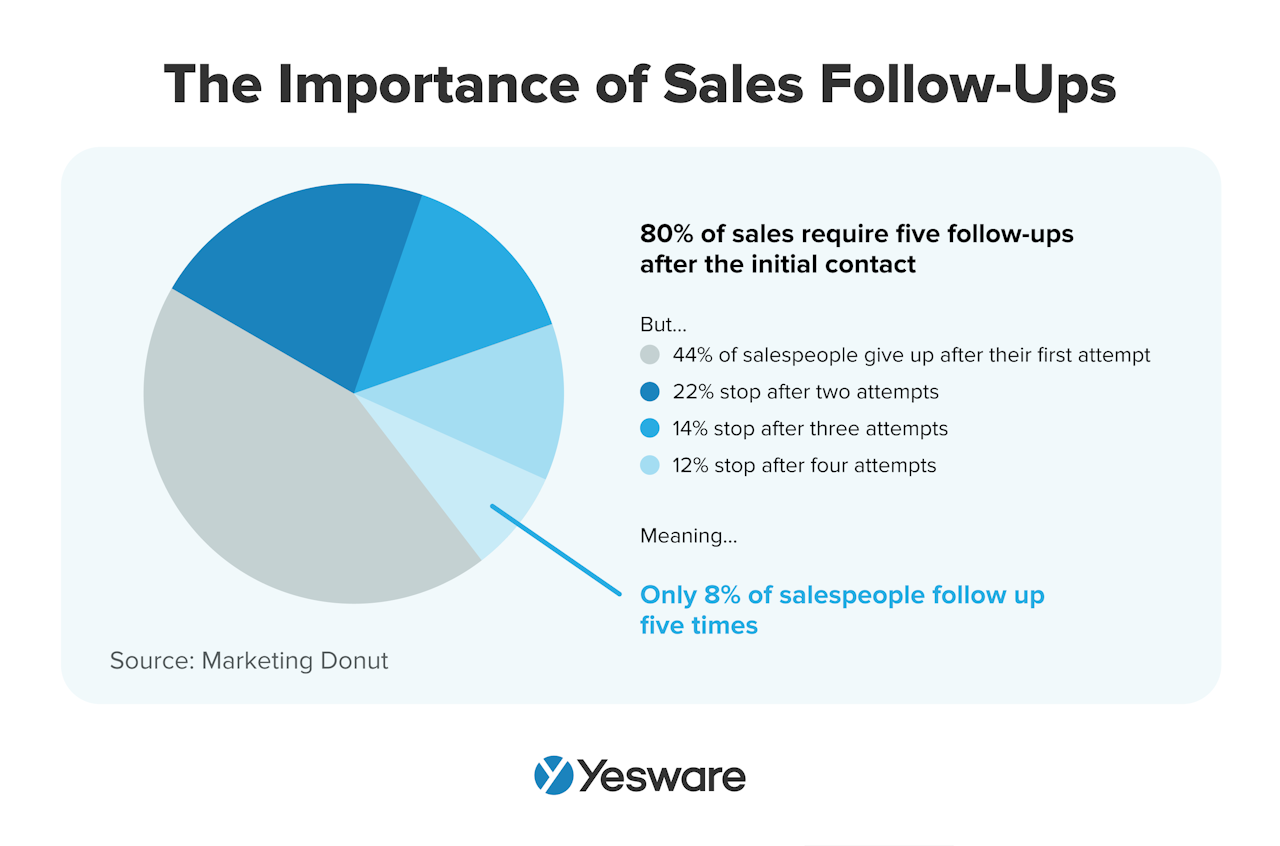 Buyers appreciate sellers who are reliable and will deliver on their promises. If you know a prospect is well-qualified and are confident you can nurture the deal without seeming pushy, don’t be afraid to follow up.
Buyers appreciate sellers who are reliable and will deliver on their promises. If you know a prospect is well-qualified and are confident you can nurture the deal without seeming pushy, don’t be afraid to follow up.
4. Use a Local Area Code
There’s almost nothing more universally annoying than spam calls and an unknown area code can be a dead giveaway that the caller on the other end has a sales agenda.
There are plenty of software platforms on the market today that change a caller’s area code to match the one they’re dialing. This small change can make a huge impact; research shows that people are four times more likely to answer a call from a local area code than an unknown one.

It’s important to note, though, that about half of the same respondents reported that they would hang up on a caller who they discovered was trying to trick them into believing they were a local caller. With that in mind, sales reps need to be ready and able to take control of the conversation as soon as the prospect answers the phone.
5. Use FOMO
One effective way to create a scarcity mindset is to use a “FOMO” approach that plays into a prospect’s fear of missing out.
Sales reps can activate a rep’s FOMO in any number of ways. Consider advertising a short-term promotion, discount, or free trial, announcing low inventory, promoting a limited-time product, or offering certain perks or benefits to only select prospects.
6. Practice Active Listening
Many sales reps already practice active listening skills without knowing that they’re practicing the psychology of selling. 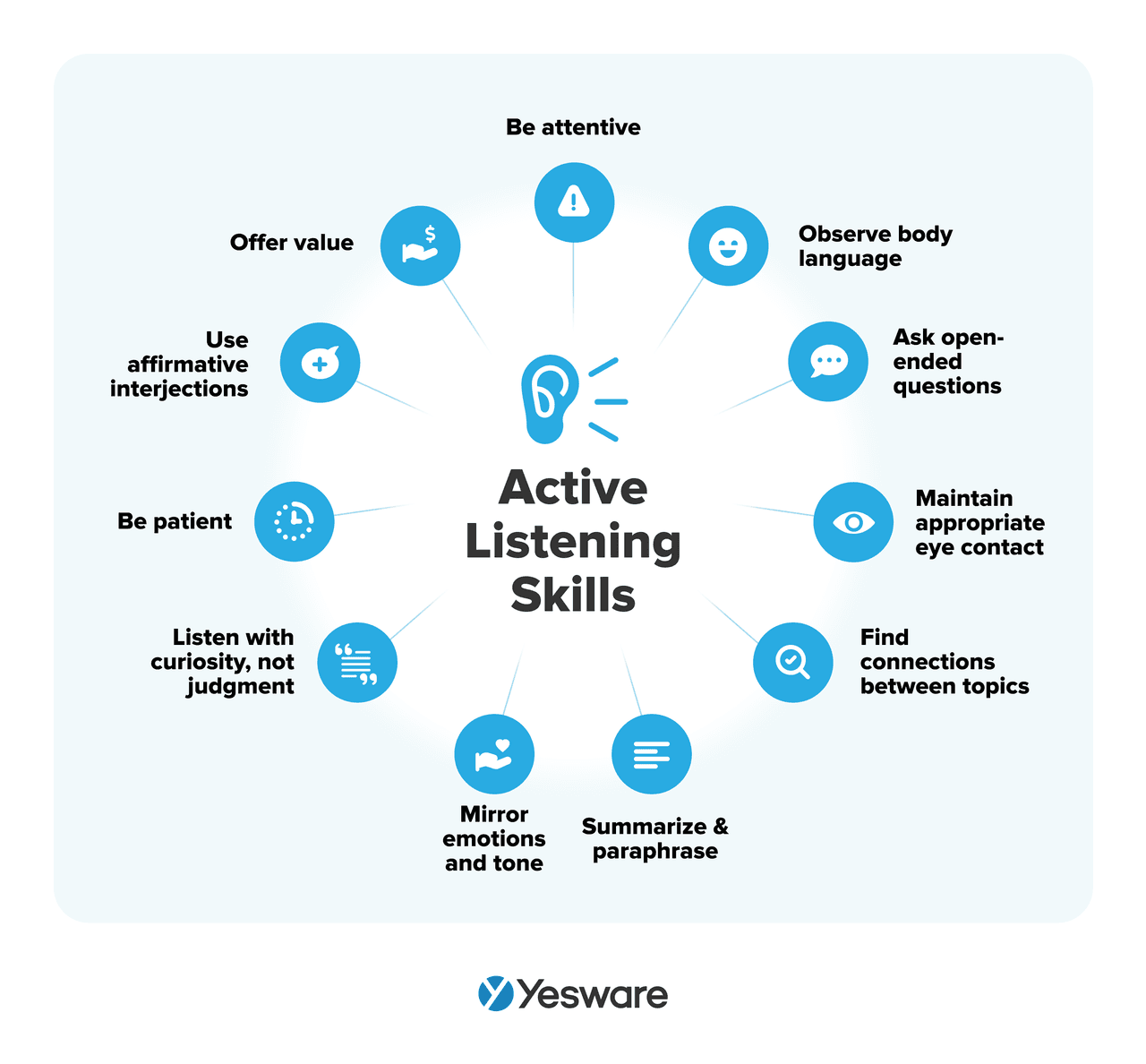 Active listening helps prospects feel heard, understood, and valued, and can create trusting conditions in which they feel very safe in sharing their most vulnerable pain points and needs.
Active listening helps prospects feel heard, understood, and valued, and can create trusting conditions in which they feel very safe in sharing their most vulnerable pain points and needs.
7. Give Them Something Valuable for Free
Your sales and marketing teams can use content marketing strategies to create a sense of authority in your field.
High-value content can be used as a lead magnet in exchange for a lead’s email address, or even provided for free in the form of an email drip campaign for those prospects with whom you’re already in contact.
High-value educational content can make your team look like a thought leader in your industry. It also creates a feeling of reciprocity for the prospect, especially if your lead magnet creates tangible results for them.
8. Leverage Their Peers (And Competitors)
Human beings have an innate need to use and/or like something that our peers are also using, enjoying, and/or benefitting from.
This is why social proof, like case studies and testimonials, can be so effective and powerful in persuading prospects.
This is also why many brands feature celebrities or other influencers in their marketing campaigns.
This principle also holds true when it comes to unfriendly peers — aka, your prospect’s competitors. Some sales reps find it effective to reference a prospect’s competitor’s success with their product; this must be done tactfully, though, in order to be appropriate and persuasive.
9. Optimize Your Blog (Or Start One if You Don’t Have One Already)
SEO-optimized blog posts are a great way to show authority and nurture leads throughout the sales funnel.
Studies show that companies that host blogs have 55% more website traffic and 97% more website links than those that don’t.
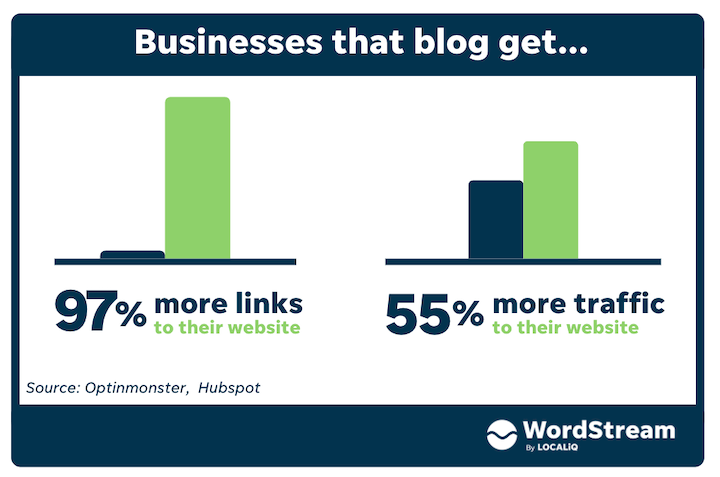
Blog posts can have significant ROI for marketers because they are evergreen. The key is to learn how to optimize the posts for SEO and keyword rankings.
10. Use Pricing Psychology
There are several ways to strategically display an offer’s price so that it influences the way a customer feels about it. This is called psychological pricing.
Some companies, for example, omit the dollar sign in their price because it gives an air of a high-quality, exclusive offer. Others rely on the “Left Digit Effect” (e.g., pricing an offer at $14.99 instead of $15.00) to make an offer appear more affordable. 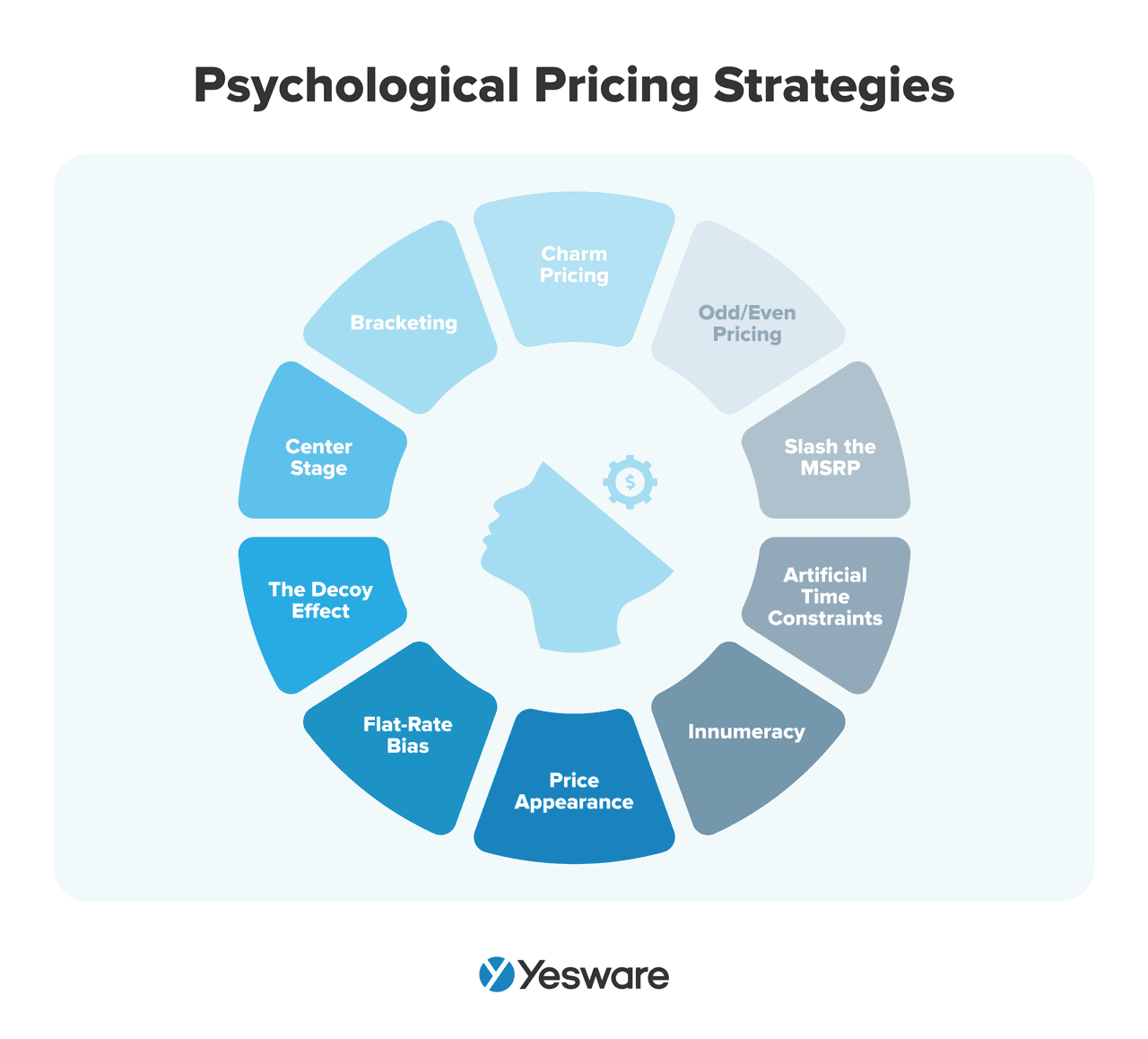 Above are just ten out of dozens, if not hundreds of sales psychology tactics that reps can practice within their next few sales cycles.
Above are just ten out of dozens, if not hundreds of sales psychology tactics that reps can practice within their next few sales cycles.
Note that some sales psychology strategies are designed to use directly within a sales conversation (i.e., FOMO, follow-ups), while others are strategies that marketers and reps can implement behind the scenes but still expect to have a psychological impact on the buyer.
Tip: Grab more psychology-backed tips and proven power words for persuading buyers.
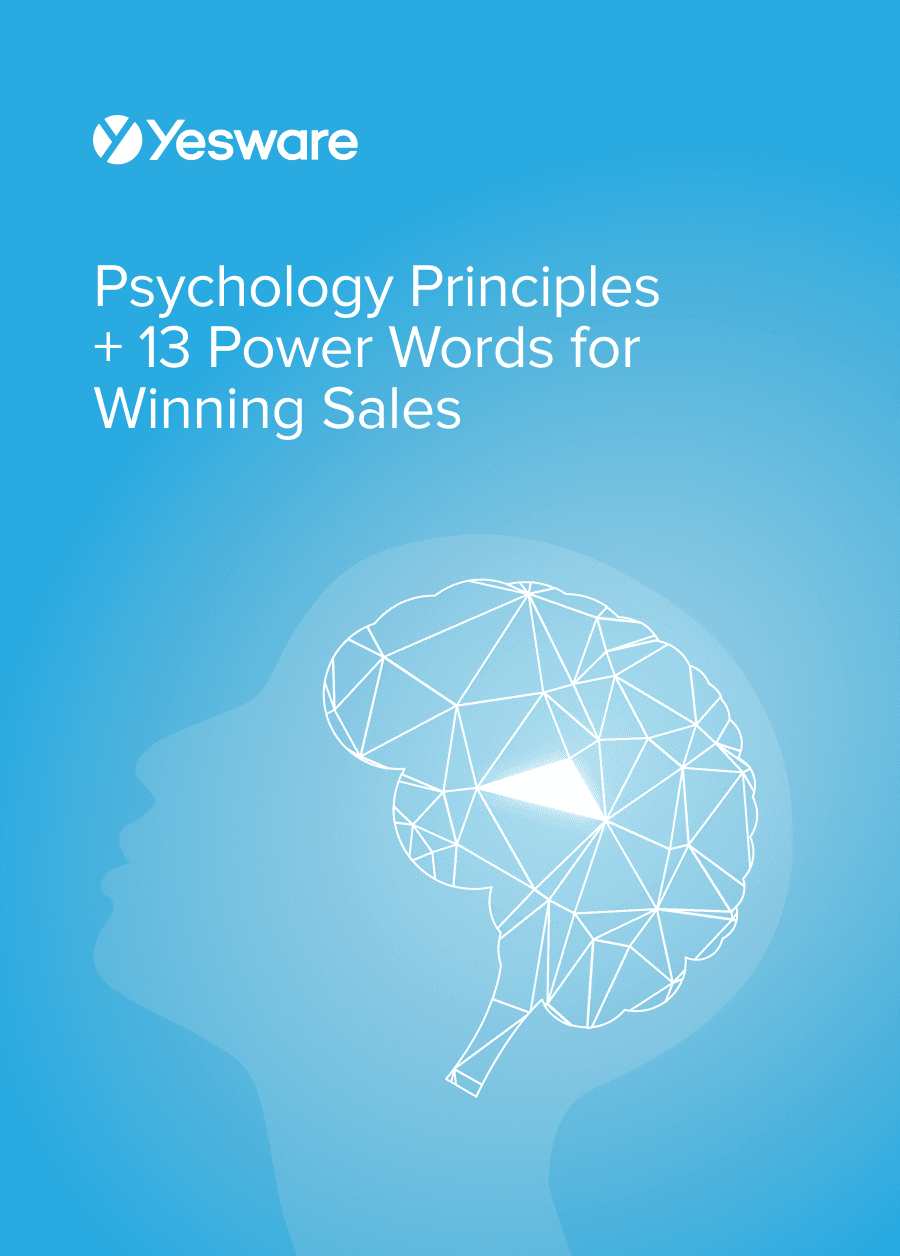 Psychology Principles + 13 Power Words for Winning SalesData-backed psychological principles, nonverbal cues, and persuasive phrases to win more deals.
Psychology Principles + 13 Power Words for Winning SalesData-backed psychological principles, nonverbal cues, and persuasive phrases to win more deals.
Books on the Psychology of Sales
Here are three of our favorite books on the psychology of sales.
The Psychology of Selling by Brian Tracy
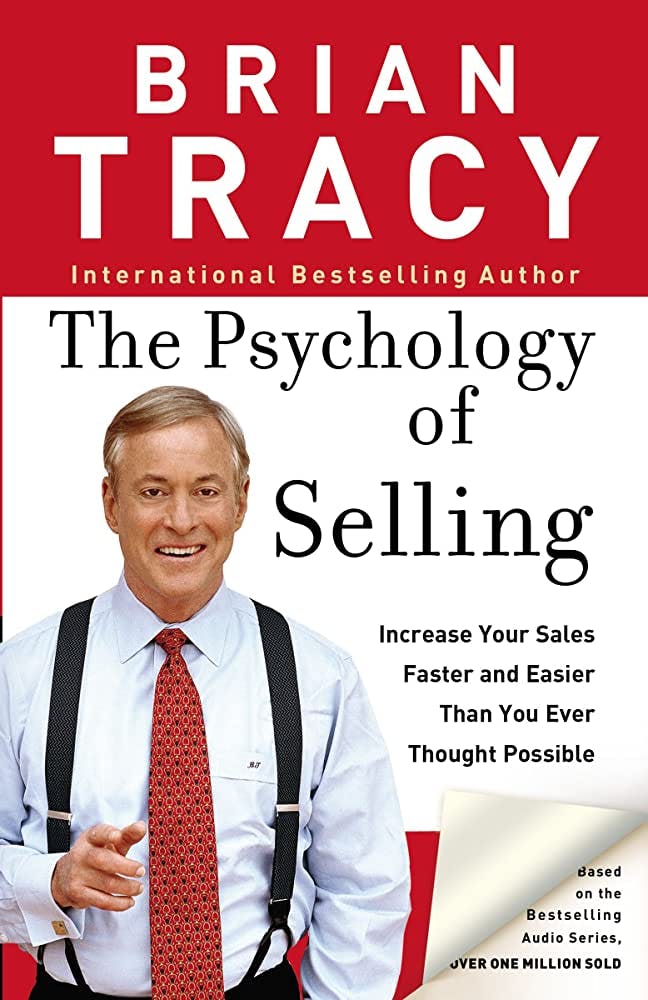
In seller and motivational speaker Brian Tracy’s famed book The Psychology of Selling, the author offers tangible, actionable strategies for sellers to use in their next sales opportunity.
His book focuses on helping sellers gain “winning edges,” or small but noticeable differences that tend to tip the scales and help top performers consistently beat the competition.
Tracy outlines the seven key result areas (KRAs) that sellers should focus on to improve their sales skills (e.g., prospecting, building rapport, answering objections, etc.), but also spends two entire chapters talking about “Why People Buy” and “The Power of Suggestion.”
Tracy suggests that people primarily buy for two reasons — the desire for gain or fear of loss — and teaches sellers how to tap into both.
The Science of Selling by David Hoffeld
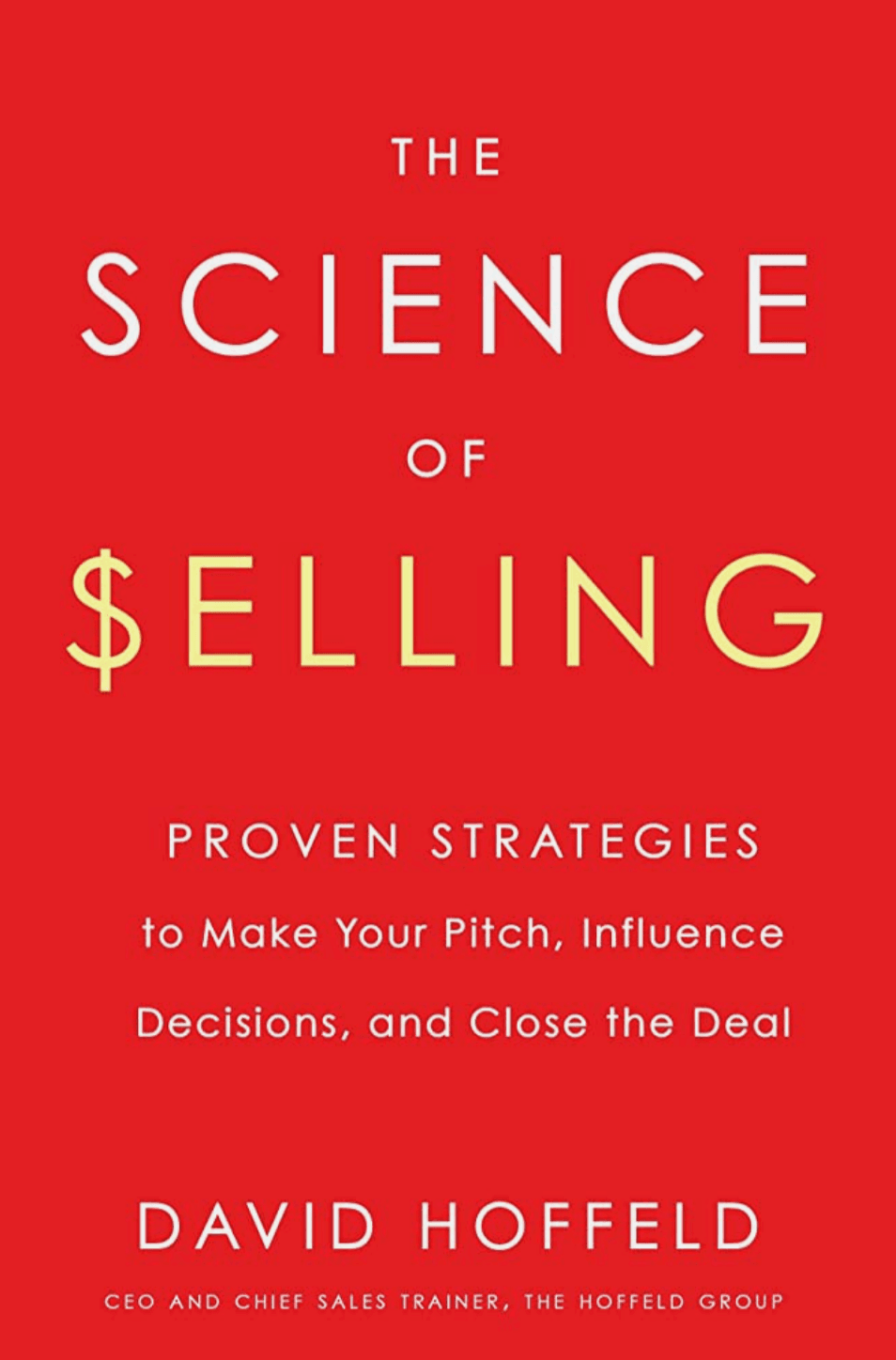
David Hoffeld’s The Science of Selling devotes an entire chapter to teaching sales reps “How to Sell the Way People Buy.” In it, he outlines the six questions sales reps need to be prepared to answer as they guide prospects through the sales process:
- Why change?
- Why now?
- Why your industry solution?
- Why you/your company?
- Why your product/service?
- Why spend this much money?
He also talks about selling to the buyer’s emotions. In this chapter, he discusses how to use the Hawthorne Effect — the change in behavior people display after they realize they are being watched — and how to steer conversations so that they naturally trigger positive emotions.
Influence by Robert Cialdini
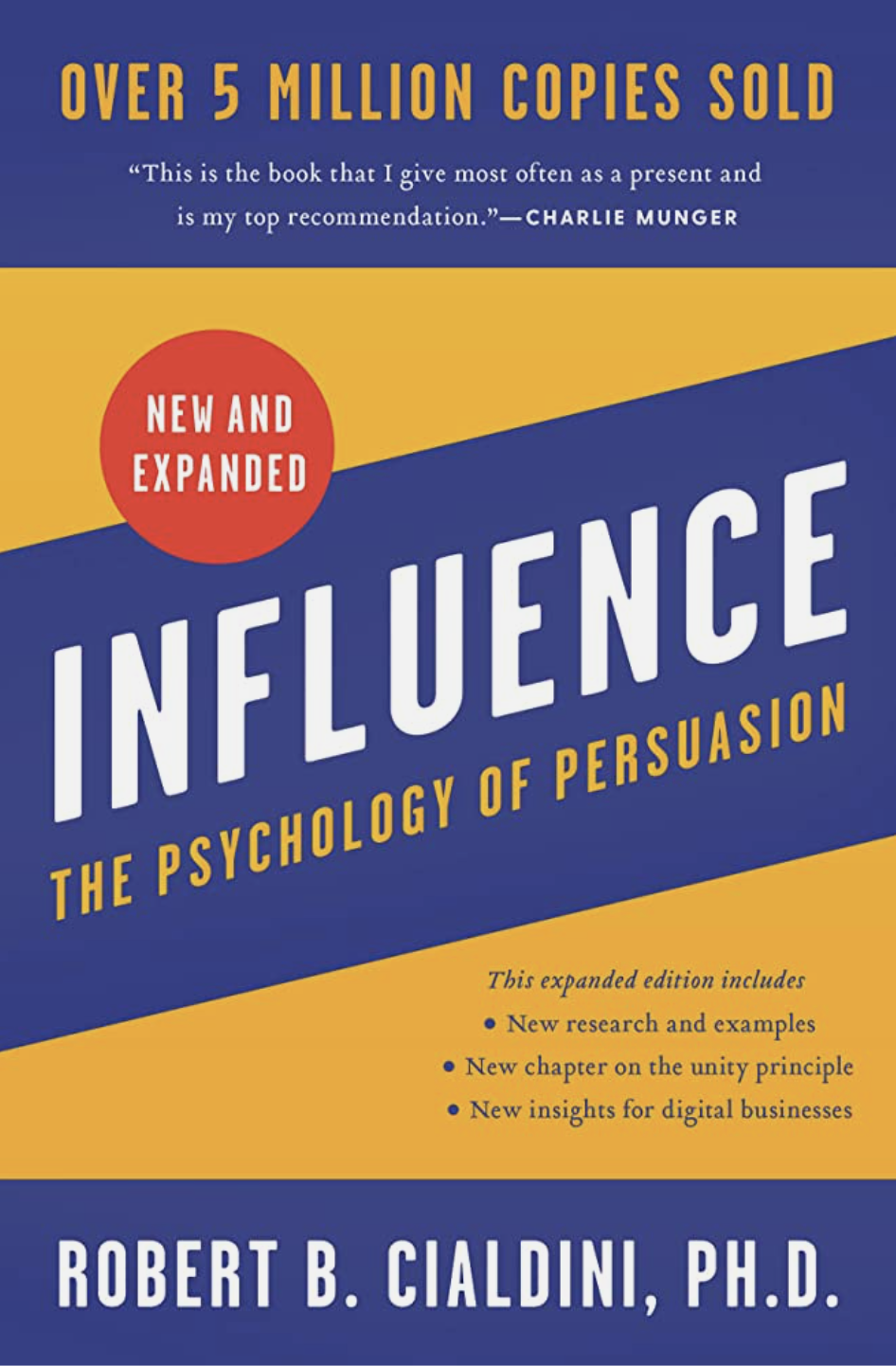
Robert Cialdini’s work in Influence was mentioned earlier in this article when we outlined the Six Principles of Persuasion: reciprocity, commitment & consistency, social proof, liking, authority, and scarcity.
Influence breaks down each of these principles in detail and relates them specifically to sales.
In fact, most of Influence follows a similar pattern; Cialdini distills complex psychological principles into easily-understandable concepts and then applies them directly to sales.
Cialdini’s is one of the most popular sales psychology books for a reason, with over three million copies sold worldwide. It is widely regarded as one of the most accessible and insightful books on the psychology of selling available today.
Do you use any psychological selling principles? Which has been most effective with your target market? What is one new strategy you’d like to try with your next sales opportunity?
Get sales tips and strategies delivered straight to your inbox.
Yesware will help you generate more sales right from your inbox. Try our Outlook add-on or Gmail Chrome extension for free, forever!
Related Articles
Melissa Williams
Anya Vitko
Casey O'Connor
Sales, deal management, and communication tips for your inbox

